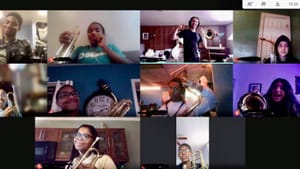Stay in the Loop
BSR publishes on a weekly schedule, with an email newsletter every Wednesday and Thursday morning. There’s no paywall, and subscribing is always free.
Growing as artists, together and apart
Young artists in the pandemic: distance learning at CAPA

Around this time of year, The Philadelphia High School for Creative and Performing Arts (CAPA) instrumental music department is usually getting ready for its annual Halloween concert, rehearsing several times a day and putting together a set topping one hour for teachers and students alike.
A scattered orchestra
Brian Ewing, band director at CAPA, described the school before COVID-19 as simply “fast-paced.”
“We were always rehearsing for something,” he said. And although that is not the case anymore, he said that virtual learning has challenged him to learn new skills as a teacher.
As a result of the school switching to online-only classes, CAPA’s instrumental music department has pivoted to more individual instruction. Ewing said that now, students can access their sheet music online, and can listen along to the music as he plays it for them. Ewing points out musical elements he wants his students to focus on, describing the ins and outs of the piece. He will continue to have the students listen and practice their parts of a given piece until they are ready to send a recording of them playing their parts on their respective instruments to him. Then, Ewing uses software like GarageBand to put the parts together, making a recording that sounds like a full band or orchestra.
Go at your own pace
Joshua Peeler, senior instrumental music major, plays the tenor saxophone and the bass clarinet. Although he was skeptical at first, he said that he is “surprised at how well everything is being handled” and how much he is learning.
“Especially with classes I struggle with, now I can just go at my own pace and not feel pressured by other people in the room,” he said. Peeler also said he is inspired by the lengths he and his classmates are going to to turn in the best recordings they can and really master the pieces they are working on. He added that it is especially helpful given that virtual learning has afforded them more time to practice their instruments.
Kayla Harris, Peeler’s classmate, echoed this sentiment. She plays the clarinet.
“I enjoy [virtual learning] actually, quite a bit,” she said. “I have a lot more free time to practice my instrument and get a lot of work done. I think it helps with my time management.”
Chances to connect
Peeler believes that as technology continues to advance, virtual learning will become the norm in terms of education. He and Harris both said that because of the extra practice time they are afforded by attending online school, they believe they are growing more as artists. Ewing, their teacher, is also filling the curriculum that would normally be used for rehearsing to study music more broadly, something both Peeler and Harris say they enjoy.
“I’m getting to know my students in a different way,” Ewing said. “We’ve been sharing YouTube videos with each other and talking about them and inspiring each other that way. We have many more chances to listen to music, use technology and talk to each other because we cannot just break out our instruments and play together. So we meet about it, talk about it, get all excited about it and then log off, do some practicing and come back the next day and say ‘look what I learned,’ or ‘check this out.’”
Friday morning
In addition to the work the instrumental music department is doing, Joanne Beaver, CAPA’s principal, said that the school practices what she calls “Fun Fridays.” Due to COVID-19, the Philadelphia School District implemented district-wide mandated half-days on Fridays that were to be used for teachers' professional development. On Friday mornings, before the teachers' afternoon sessions, CAPA offers one-hour workshops to students, across a wide variety of subjects. According to Beaver, CAPA students can sign up for two one-hour workshops each Friday, led by CAPA teachers. Students can take workshops in yoga, meditation, gaming, crafting, cooking, and makeup, to name a few of the offerings.
“You name it, we got it,” she said.
Students do not have to sign up for workshops, however. They can use this time to practice their dance moves, their instrument, a new song they are learning, or just do plain old regular schoolwork.
Good attendance
It’s also worth noting that CAPA provided all the materials the students may need to attend school from home. Over the summer, students were able to pick up laptops, clay, sheet music, instruments, and more at the school. According to Beaver, the school is also averaging a 99 percent attendance rate each day.
“CAPA has always been a really, really special place,” Ewing said. “It’s one of the happiest schools I’ve ever taught at with the most cooperative students. It’s just always had a very positive atmosphere and I’m lucky that I get to teach there every day.”
Image description: A screenshot from a group online school session that is a grid of ten teenagers, each in their own homes, smiling and holding shiny brass instruments, including trumpets and saxophones.
Sign up for our newsletter
All of the week's new articles, all in one place. Sign up for the free weekly BSR newsletters, and don't miss a conversation.

 Isabel Soisson
Isabel Soisson